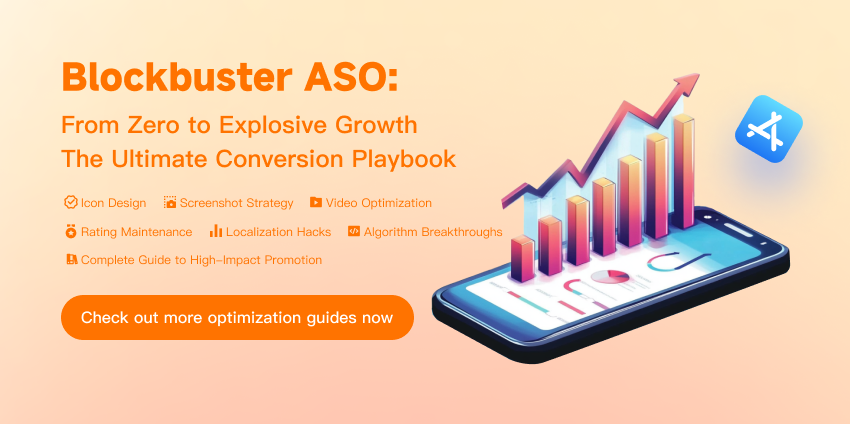
Loading...
Free consultation with ASO specialists
Doing ASO for the first time or have no idea how to carry out targeted optimization of your app?
We offer one-on-one customized services provided by app marketing specialists
App Store Rank
What is the App Store Ranking
App Store Rank refers to the position of an application in the search results of categories or keywords based on algorithmic calculations in Apple's App Store and Google's Google Play store. It is one of the core indicators for measuring the performance of the application market, directly reflecting the exposure, user preferences, and competitiveness of the application.
-
Apple App Store Rankings : It is determined by a combination of factors such as download volume, user ratings, activity (such as frequency of opening), retention rate, and keyword relevance. It is divided into "category ranking" (such as social and tool category rankings) and "search ranking" (based on the results of user search keywords).
-
Google Play Ratings and Reviews : More emphasis is placed on the number of installations, user engagement (such as session duration and in-app purchase frequency), update frequency, regional localization performance, and keyword matching in descriptions. Rankings are divided into "Popular Charts", "Trend Charts" and "Search Results Rankings".
Why is the App Store ranking important
-
The core value of the traffic entrance
More than 65% of downloads in the app store come from search and chart exposure, and a higher ranking means a greater ability to acquire natural traffic. High-ranking apps are more likely to enter "Editor's Choice" and "Popular Charts", receive platform traffic support, and increase exposure by more than 10 times.
-
Quantitative representation of user trust
Ratings are an important reference for user decision-making. Data shows that the conversion rate of the top 5 apps is higher than that of apps ranked below 10, and users equate rankings with "quality experience" by default.
-
The basis of commercialization and monetization
High-ranking apps have stronger bargaining power in advertising cooperation, in-app purchase conversion and brand exposure.
-
Construction of competitive barriers
Applications that have long occupied the forefront of niche areas can squeeze out competitors' space through the "Matthew Effect" and form a user's mind occupation (such as WhatsApp in social networking and Amazon in shopping).
How to improve App Store rankings
-
Keyword Optimization
-
Precise word selection: Use tools (such as UPUP) to mine high-traffic, low-competition words, prioritize titles and subtitles, and account for more than 50% of the weight.
-
Long-tail coverage: cover segmented demand words in the 100-character keyword field, while focusing on long-tail word coverage optimization.
-
Improve conversion rate
-
Material optimization: The first picture and the first 3 seconds of the video should highlight the core selling points. High-quality materials can increase the conversion rate by 30%.
-
Ratings management: Applications with ratings ≥4.5 stars have a high conversion rate, and users are guided to give positive reviews through embedded feedback pop-up windows.
-
Increase downloads and activity
-
Search Ads synergy: launch high-relevance keyword ads, increase natural ranking in the short term, and optimize CPT at the same time.
-
User Retention: Apple's algorithm focuses on uninstall rate, and the ranking of applications with next-day retention rate ≥40% is more stable.
-
Localization and Iteration
-
Localizing metadata for regions can increase regional downloads by 25%.
-
Update keywords and materials every 6-8 weeks to adapt to trends (such as holidays, function upgrades).
Relationship with ASO (App Store Optimization)
-
ASO is a methodology to improve rankings
ASO systematically improves the ranking of applications in search and lists by optimizing visible elements in the application store (keywords, metadata, ratings, etc.), which is a core strategy to achieve high rankings.
-
Ratings are the quantified results of ASO effects
The ultimate goal of ASO is to reduce the cost of customer acquisition through natural traffic, and ranking is a direct indicator of measuring the effectiveness of ASO.
-
Dynamic linkage of the long-term process
The algorithm of the app store is constantly updated, and it is necessary to maintain or improve the ranking through continuous optimization of ASO (such as quarterly keyword review, competitor monitoring), forming a positive cycle of "optimization - ranking increase - traffic growth".
App Store rankings are an intuitive reflection of the competitiveness of the application market. Its essence is the comprehensive evaluation of the "user value" of the application by the store algorithm. Through the fine operation of ASO, combined with short-term promotion and long-term iteration, it can effectively improve the ranking and achieve dual growth in natural traffic and commercial value.
Related terms
